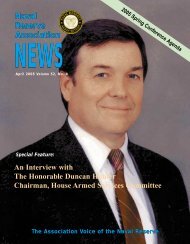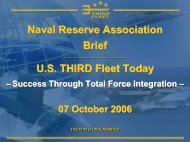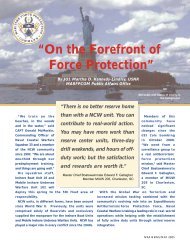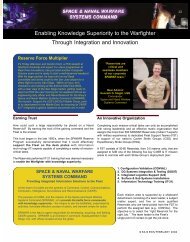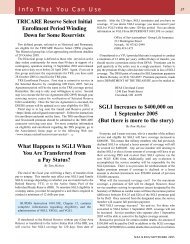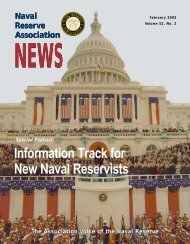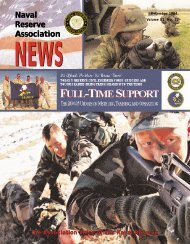Naval Reserve Association Naval Reserve Association
Naval Reserve Association Naval Reserve Association
Naval Reserve Association Naval Reserve Association
- No tags were found...
Create successful ePaper yourself
Turn your PDF publications into a flip-book with our unique Google optimized e-Paper software.
Junior OfficerColumnWorkplace Politics 101By Charlene Majersky, Ph.D.Guest ColumnistLT Steven Michaels, USNNational VP for Junior OfficersHave you ever been blindsidedat a meeting?Have you ever feltpowerless to implementan important novel idea?These are some examplesof organizational politics.You don’t have to work in an office to befamiliar with workplace politics. Anyonewho has ever had any job, anywhere,knows that the dynamics among thosewho are part of the work environment playa vital role in the manner in which abusiness is run. Workplace politics issomething most people recognize whenthey see it in action. Undoubtedly, everyworkplace has its own politics.At the core of workplace politics is theword power. For some individuals, powercarries a negative association, coupledwith influence, control, and manipulation.Sadly enough, all too often, power hasbeen abused. After all, who hasn’tencountered at least one manipulative,dishonest, or backstabbing colleague?In the business world, power is analogousto money and comes in many forms, suchas knowledge and information; access topeople and resources; decision-makingauthority; and leeway to take risks. Anindividual’s capability to extend, share,trade, or negotiate power is a primarycomponent of workplace politics. Thereality is that power is not a bad thing,provided you understand it and utilize itfor constructive outcomes.In 1993, while researching low-costsoftware development methods for theDepartment of Defense, Mr. Brennerdiscovered that equally important todecreasing development costs wasascertaining better ways for engineersto work collaboratively. That work ledMr. Brenner to develop what is knowntoday as “Workplace Politics AwarenessMonth.”The month of October is designatedWorkplace Politics Awareness Month,whereby both employers and employeesare afforded the opportunity to considerwhat they can do to transform toxicworkplace politics into an impetus forcreativity. Toxic politics is detrimental torelationships and hurts people andorganizations. On the other hand, creativepolitics helps us to arrive at better solutionsand to create innovations. Creative politicsis the basis of healthy competitions.The message of Workplace PoliticsAwareness Month is that, although wecannot completely eliminate workplacepolitics, one way to remove it is by dealingwith it openly and directly. This strategyhas a huge return on investment becausewhen we keep politics creative, we makebetter decisions for the organization,which enable us to accomplish its mission.As a health care administrator, Iconstantly ask myself the followingquestions: Am I thriving in workplacepolitics or am I being crushed? Are myteams functioning at a high level, or arethey struggling through continuous conflict?The workplace has become increasinglymore demanding and highly competitive.By establishing your unique politicalplace in the work environment, youempower yourself to take complete chargeof your work life and, ultimately, exhibitthat power to others around you. Still,while you may not be able to control biasesor cultural insensitivities in the workplace,lack of attention to office politics canresult in further alienation or create barriersto advancement.What can you do to thrive in a politicalenvironment? There is no magic formula;but common sense, playing fairly, andsound judgment are excellent startingpoints. My three suggestions for managingoffice politics are:(1) Do what is right – Reputations aredifficult enough to build, but easy todestroy. Be known as a person who istrustworthy, reliable, honest, and fair. Dowhat you say you will do. Speak up whenyou hear false rumors or unfair criticism.Even if everyone doesn’t like you, at leastyou will be respected by most;(2) Be strategic – Pick your battles,because you can’t win every time. Don’temploy all-or-nothing thinking; instead,aim for win-win outcomes and look forcompromises that won’t jeopardize yourhonor; and,(3) Build a strong network – Few of ussucceed without help. Cherish friendsand supporters. Cultivate mentors andconfidants who will offer sound adviceand share important information. Ask forcandid feedback regularly.In a competitive work environment,being politically adept is as important asbeing intelligent, talented, and hardworking.The politically savvy don’t believe in thenegative stereotype of organizational politics.They understand that organizational politicsis a double-edged sword which can beused to cut through bureaucracy andoutdated processes, or it can be utilizednegatively to cut down others’ innovativeideas or colleagues standing in the way ofa desired promotion.The politically savvy excel at acceleratingthe trust-building process. Often, theyutilize their word as their bond and keepit. Furthermore, working openly for thebest interests of the organization, theydon’t have hidden agendas and, therefore,can play fairly.Finally, politically astute individualsoperate ethically, which results in muchhigher influence throughout the organization.After all, ethical individualsare the foundation for establishing anethical culture because each person hashis/her own personal best at heart.Notwithstanding, ethically based culturesbring out the personal best in most people.The end result is increased job satisfactionand high performance.14 NRA NEWS/SEPTEMBER 2007




